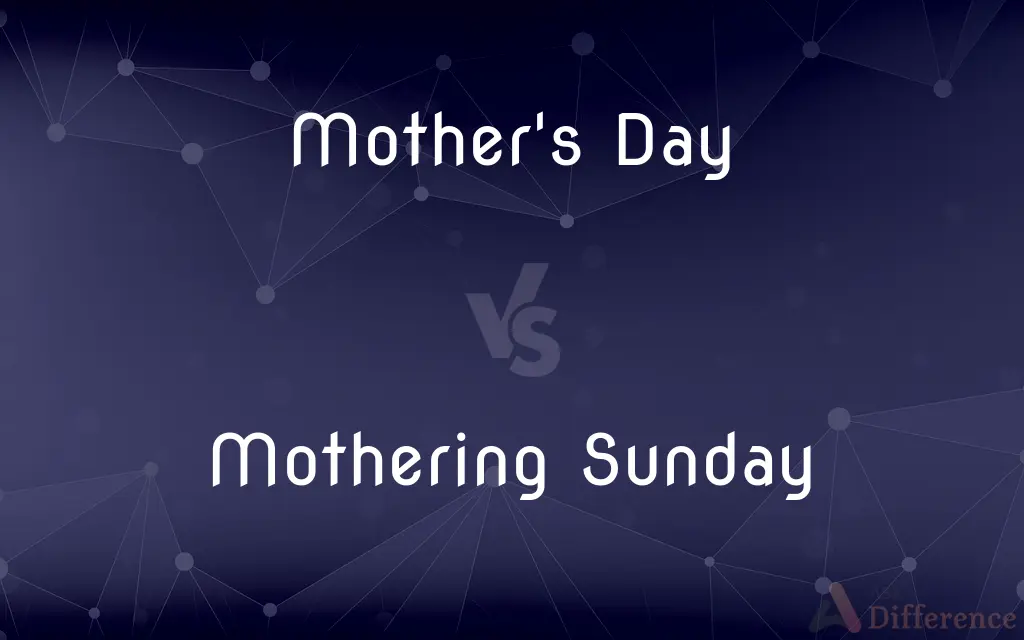Mother's Day vs. Mothering Sunday — What's the Difference?
Edited by Tayyaba Rehman — By Fiza Rafique — Published on November 21, 2023
Mother's Day is a secular holiday honoring mothers, celebrated on the second Sunday of May in the U.S. Mothering Sunday, historically a Christian event, falls on the fourth Sunday of Lent in the UK, originally marking a return to one's mother church.

Difference Between Mother's Day and Mothering Sunday
Table of Contents
ADVERTISEMENT
Key Differences
Mother's Day is a universally recognized day dedicated to honoring and showing appreciation to mothers for their love, care, and sacrifices. It's primarily a secular celebration in many parts of the world. On the other hand, Mothering Sunday, predominantly observed in the UK and parts of Europe, has its roots deeply embedded in Christian traditions and originally had no connection to honoring mothers.
Mother's Day in the U.S. and many other countries falls on the second Sunday of May. Anna Jarvis is credited with the establishment of this day in the early 20th century as a tribute to her own mother and all mothers. Mothering Sunday, however, is determined by the Christian calendar, occurring on the fourth Sunday during Lent.
The celebration of Mother's Day involves giving gifts, flowers, and cards to mothers. Families might also host special meals or outings in honor of the maternal figures in their lives. Mothering Sunday was traditionally a day when people would return to their 'mother church' - the church in their home parish. Over time, it evolved to include giving gifts and flowers to one's mother, thereby drawing parallels to the American Mother's Day.
While Mother's Day has become highly commercialized in many regions, focusing on buying presents and sending cards, Mothering Sunday retains a more religious overtone, though it too has seen a shift towards commercialization in recent years.
In essence, while both Mother's Day and Mothering Sunday may seem similar in name and have converged in some of their celebratory aspects, their origins and initial purposes were notably distinct.
ADVERTISEMENT
Comparison Chart
Origin
Secular, established by Anna Jarvis
Christian tradition, return to 'mother church'
Date of Observation
Second Sunday of May
Fourth Sunday of Lent
Primary Region
U.S. and many other countries
UK and parts of Europe
Initial Purpose
Honor and appreciate mothers
Return to one's home church or parish
Modern Celebrations
Giving gifts, cards, and flowers to mothers
Religious observance and giving gifts/flowers to mothers
Compare with Definitions
Mother's Day
A day to express gratitude to maternal figures.
Children often craft handmade gifts for their mothers on Mother's Day.
Mothering Sunday
An event that evolved to honor mothers in the UK.
Over time, giving gifts to mothers became a part of the Mothering Sunday tradition.
Mother's Day
A day dedicated to honoring mothers and motherhood.
Many families host brunches or dinners to celebrate Mother's Day.
Mothering Sunday
A Christian tradition on the fourth Sunday of Lent.
Many attend church services on Mothering Sunday to mark the occasion.
Mother's Day
An occasion for children to pamper their mothers.
Spa treatments and breakfast in bed are popular treats on Mother's Day.
Mothering Sunday
A UK-centric celebration with religious roots.
While it's secularized now, Mothering Sunday has a religious origin in the UK.
Mother's Day
A globally recognized day for maternal appreciation.
Mother's Day is celebrated in many countries, though the date might vary.
Mothering Sunday
A day originally for visiting one's 'mother church'.
Historically, people would travel back to their home parishes on Mothering Sunday.
Mother's Day
A secular celebration on the second Sunday of May.
Stores often have special sales in anticipation of Mother's Day.
Mothering Sunday
A precursor to the American Mother's Day in some respects.
The commercial aspects of Mothering Sunday and Mother's Day have become increasingly similar.
Common Curiosities
What's the religious significance of Mothering Sunday?
Mothering Sunday originally marked a return to one's 'mother church' or home parish.
Is Mothering Sunday exclusive to the UK?
While most associated with the UK, Mothering Sunday is also observed in some other parts of Europe.
Who founded the modern Mother's Day?
Anna Jarvis is credited with founding the modern Mother's Day.
Are Mother's Day and Mothering Sunday on the same date?
No, Mother's Day is on the second Sunday of May, while Mothering Sunday is on the fourth Sunday of Lent.
Is Mothering Sunday still a religious event?
While it has religious origins, it's largely secularized now, similar to Mother's Day.
Can Mothering Sunday and Mother's Day be used interchangeably?
They're distinct in origin, but in modern contexts, especially outside the UK, they can be confused.
Is there a specific flower associated with Mother's Day?
Carnations, especially pink and white ones, are often associated with Mother's Day.
Are there songs or poems associated with Mother's Day?
Many songs and poems have been written about mothers and are popularly recited or sung on Mother's Day.
When is Mother's Day celebrated in the U.S.?
Mother's Day is celebrated on the second Sunday of May in the U.S.
Why is Mothering Sunday during Lent?
It's tied to Christian traditions, marking a time to visit one's home church midway through Lent.
How did Mother's Day become so commercialized?
Over time, businesses saw the potential to market gifts and special promotions for Mother's Day.
How did Mothering Sunday evolve to honor mothers?
Over time, as people visited their home parishes, it became customary to also visit and honor one's mother.
Are there countries that celebrate both Mother's Day and Mothering Sunday?
In some places, like the UK, the traditions of Mothering Sunday have merged with the secular Mother's Day, but they are inherently different events.
What's a traditional gift for Mother's Day?
Flowers, cards, and handmade crafts are popular gifts for Mother's Day.
Is there a specific way to celebrate Mothering Sunday?
Traditionally, it involved attending church, but now it's also about giving thanks to mothers with gifts or meals.
Share Your Discovery

Previous Comparison
Mozzarella Cheese vs. Parmesan Cheese
Next Comparison
Carbonic Acid vs. BicarbonateAuthor Spotlight
Written by
Fiza RafiqueFiza Rafique is a skilled content writer at AskDifference.com, where she meticulously refines and enhances written pieces. Drawing from her vast editorial expertise, Fiza ensures clarity, accuracy, and precision in every article. Passionate about language, she continually seeks to elevate the quality of content for readers worldwide.
Edited by
Tayyaba RehmanTayyaba Rehman is a distinguished writer, currently serving as a primary contributor to askdifference.com. As a researcher in semantics and etymology, Tayyaba's passion for the complexity of languages and their distinctions has found a perfect home on the platform. Tayyaba delves into the intricacies of language, distinguishing between commonly confused words and phrases, thereby providing clarity for readers worldwide.













































